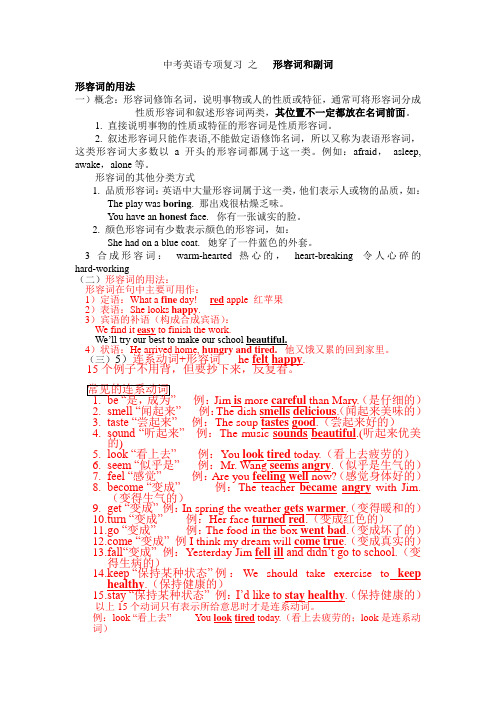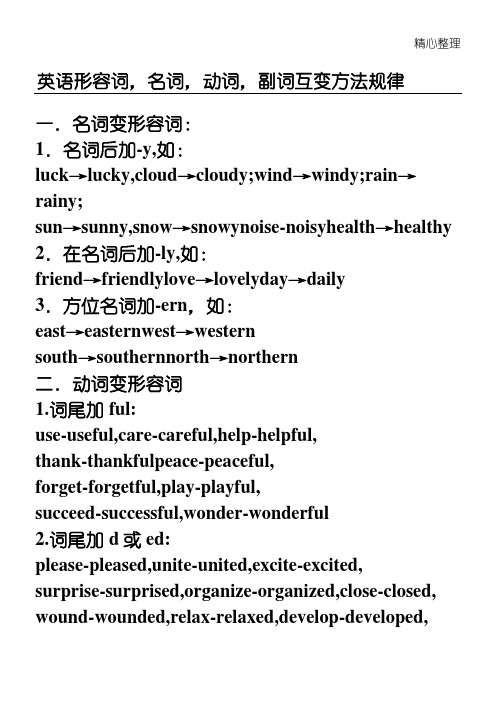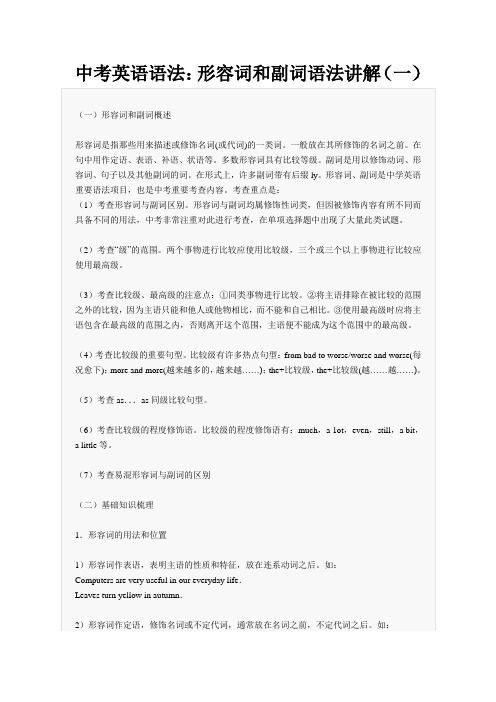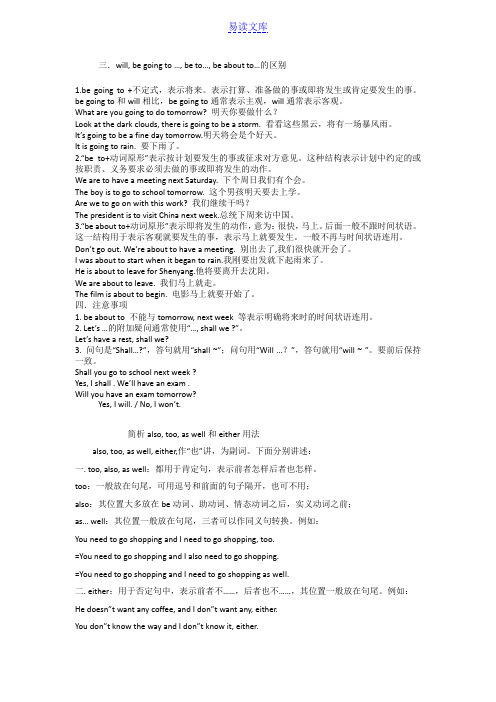形容词变副词小结
语法填空技巧

语法填空技巧语法填空的题目虽然难度相对较大,相信只要同学们能够清楚地了解这类题目的命题特点和命题规律,掌握答题的技巧,有针对性地多加练习,及时对经验进行总结,就能提高语法填空题的准确率。
语法填空只有十个空,加上还没有选项,那么语法填空要考察的东西会比较有限,这样就形成了一定有规律的东西,今天我们就共同探讨一些关于语法填空基础的解题技巧。
第一部分:无提示词先看以下例句:I met him in a shop which sells fruit when I was seeing what I like.I met him in a shop which sells fruit when I was seeing what I like.I met him in a shop which sells fruit when I was seeing what I like.I met him in a shop which sells fruit when I was seeing what I like.I met him in a shop which sells fruit when I was seeing what I like.I met him in a shop which sells fruit when I was seeing what I like.I met him in a shop which sells fruit when I was seeing what I like.这些句子是一样的,只是想通过这种方式给大家一个直观的感受。
加深的部分就是通常要考察的部分,也就是说一个句子通常会有七个位置的考点,这些位置考察的内容比较固定,我们逐个分析。
无提示考点一:(代词主格)_____ met him in a shop which sells fruit when I was seeing what I like.要填的是句子的主语,主语通常由名词或代词充当,如果没有任何提示,不可能填名词,只能根据上下文的内容填代词。
反义词,对应词小结:

反义词,对应词小结:一.形容词black-黑色的--white白色的new 新的---old旧的big大的---small小的clean干净的---dirty脏的young年轻的---old年老的bright-明亮的--dark暗的good好的---bad坏的right正确的---wrong错误的quiet-安静的--active 活跃的strict严格的---kind和蔼的strong强壮的---weak虚弱的thin瘦的---fat肥的long长的---short短的tall高的---short矮的large大的---little小的cold寒冷的---hot炎热的cool凉爽的---warm暖和的beautiful漂亮的---ugly丑陋的clever聪明的---stupid愚蠢的inside里面的---outside外面的dark-深色的--light浅色的heavy重的---light轻的glad-/happy高兴地--sad悲伤的easy容易的---difficult/hard困难的fast快的---slow慢的quiet安静的---noisy吵闹的late-晚的--early早的same相同的---different不同的thick厚的---thin薄的cheap便宜的---expensive/dear昂贵的few少数的---many大量的little少量的---much大量的hard坚硬的---soft柔软的二.名词brother兄,弟---sister姐,妹son 儿子---daugther女儿wife 妻子---husband 丈夫girl女孩---boy男孩woman妇女---man男人aunt姨母---uncle 姨丈mum-妈妈--dad爸爸grandma奶奶--grandpa爷爷Mrs太太---Mr先生madom女生---sir先生day白天---night晚上rooster公鸡---hen母鸡cow母牛---ox公牛city城市---country乡下waiter男服务员---waitressr女服务员actor男演员---actress女演员student学生---teacher教师left左---right右south南---north北east东---west西三.动词go 去---come来cry 哭---laugh笑open 开---close关love爱---hate恨sit坐---stand站bring 带来---take 拿走ask问---answer 答forget忘记---remember记住turn on 开---turn off关get on 上车---get off 下车put on 穿上----take off 脱下四.代词this这---that那these这些---those那些he他--she 她him他(宾格)---her 他(宾格)五.介词in在……里面---out在……外面up向上---down 向下before在……前---after 在……后on在……上面---under在……下面behind 在……后面---in front of 在……前面六.副词yes-是--no不是here这里---there哪里。
中考英语形容词,副词知识点

中考英语专项复习之形容词和副词形容词的用法一)概念:形容词修饰名词,说明事物或人的性质或特征,通常可将形容词分成性质形容词和叙述形容词两类,其位置不一定都放在名词前面。
1. 直接说明事物的性质或特征的形容词是性质形容词。
2. 叙述形容词只能作表语,不能做定语修饰名词,所以又称为表语形容词,这类形容词大多数以a开头的形容词都属于这一类。
例如:afraid,asleep, awake,alone等。
形容词的其他分类方式1. 品质形容词:英语中大量形容词属于这一类,他们表示人或物的品质,如:The play was boring. 那出戏很枯燥乏味。
You have an honest face. 你有一张诚实的脸。
2. 颜色形容词有少数表示颜色的形容词,如:She had on a blue coat. 她穿了一件蓝色的外套。
3 合成形容词:warm-hearted 热心的,heart-breaking 令人心碎的hard-working(二)形容词的用法:形容词在句中主要可用作:1)定语:What a fine day! red apple 红苹果2)表语:She looks happy.3)宾语的补语(构成合成宾语):We find it easy to finish the work.We’ll try our best to make our school beautiful.4)状语:He arrived home, hungry and tired.他又饿又累的回到家里。
(三)5)连系动词+形容词he felt happy.15个例子不用背,但要抄下来,反复看。
例:Jim is more careful than Mary.(是仔细的)2.smell “闻起来”例:The dish smells delicious.(闻起来美味的)3.taste “尝起来”例:The soup tastes good.(尝起来好的)4.sound “听起来”例:The music sounds beautiful.(听起来优美的)5.look “看上去”例:You look tired today.(看上去疲劳的)6.seem “似乎是”例:Mr. Wang seems angry.(似乎是生气的)7.feel “感觉”例:Are you feeling well now?(感觉身体好的)8.become “变成”例:The teacher became angry with Jim.(变得生气的)9.get “变成”例:In spring the weather gets warmer.(变得暖和的)10.t urn “变成”例:Her face turned red.(变成红色的)11.g o “变成” 例:The food in the box went bad.(变成坏了的)12.c ome “变成”例I think my dream will come true.(变成真实的)13.f all“变成”例:Yesterday Jim fell ill and didn’t go to school.(变得生病的)14.k eep “保持某种状态”例:We should take exercise to keephealthy.(保持健康的)15.s tay “保持某种状态”例:I’d like to stay healthy.(保持健康的)以上15个动词只有表示所给意思时才是连系动词。
形容词变副词规律小结

形容词变副词规律小结规则变化范围变化规则例词1大部分形容词加ly careful----carefullyquiet----quietlydifferent----differently2以le结尾的形容词变le为ly terrible----terriblycomfortable----comfortablysimple----simply3以y结尾的形容词变y为ily easy----easilyhappy----happilyheavy----heavily不规则变化1本身既是形容词也是副词,无需改变hard----hardfar----farfast----fastearly----early2形容词和副词为完全不同的单词good----well3初中阶段唯一一个需要去掉字母e的单词true----truly4虽然以ly结尾,但却是形容词,不能直接用来修饰动词friendlylovelyfatherly有些形容词本身即为副词,同时也有加ly的副词形式。
但加不加ly意思不一样,使用时需注意wide(形容词,宽阔的,睁大的)----wide(副词,睁大地)/widely(副词,广泛地), late(形容词,晚的)-----late(副词,晚地),lately(最近)high(形容词,高的)----high(副词,高地)/highly(副词,高度地)特别容易犯错的副词形容词副词备注hard hard hard副词容易写成hardly, hardly意思为“几乎不”,与hard无任何关系friendly无不能用friendly直接修饰动词,只能改成ina friendly way“用一种友好的方式”。
如:He smiled at me in a friendly way.excited excitedly 容易拼错healthy healthily容易拼错polite politely不用去掉字母e。
形容词和副词专题小结与练习

形容词和副词专题小结与练习一、形容词:表示人或物我性质和特征。
在句子中作定语、表语和宾语补足语。
1、作定语。
①形容词作定语常放在所修饰的名词之前。
I have a good book . The red coat is mine .②但形容词如果修饰不定代词时,形容词应放在不定代词的后面。
I have something new to tell you.There is nothing wron g with your bike .Do you have anything importan t to say? Does anybody eles live here?2、作表语Eg : She is very beautiful . The cat is black.但有一部分形容词只能作表语,不能作定语。
这类形容词叫做“表语形容词”。
我们学过的有sorry ,afraid,ill, glad, alone, asleep,awake等。
(以a开头表语形容词常不能用直接修饰,而用very much)Eg: I am very much afraid of dogs.3、作宾语补足语Eg We should keep our classroom clea n. It makes me happy.二、形容词的名词化,在某些形容词前加表示一类人,相当名词。
如:The old老人the young年轻人the rich富人the poor穷人三、形容词的近义词nice / kind large/big glad /happy/pleased clever/brightdear/ expensive hard/difficult fine/well ill/sick四、形容词的反义词big----small back—white busy---free cold---hot cool--- warmdead---alive safe--- dangerous dry--- wet fast---slow less—morehigh---low little --- much least---most few---many worse---betteropen---closed worst---best cheap---dear possibe---impossible happy---unhappy/sad early---late new---old old ---young easy---hard right----lefthard---soft long---short short--- tall well---ill fat---thinthin---thick heavy---light wrong—right副词:在句子修饰动词、形容词、副词或整个句子。
英语形容词-名词-动词-副词-互变方法规律

精心整理英语形容词,名词,动词,副词互变方法规律一.名词变形容词:1.名词后加-y,如:luck→lucky,cloud→cloudy;wind→windy;rain→rainy;sun→sunny,snow→healthy2.在名词后加-ly,如:friend→friendlylove→3.方位名词加-erneast→south→1.forget-forgetful,play-playful,succeed-successful,wonder-wonderful2.词尾加d或ed:please-pleased,unite-united,excite-excited,surprise-surprised,organize-organized,close-cl osed,wound-wounded,relax-relaxed,develop-developed, appreciate-appreciated,frustrate-frustrated, interest-interested,annoy-annoyed,use-used, frighten-frightened,crowd-crowded,thrill-thrilled,pollute-polluted3.词尾加ing:interest-interesting,surprise-surprising,live-livingrock-rocking,sleep-sleeping4.词尾变y为i,加ed:worry-worried,marry-married,fry-fried,terrify-terrifiedsatisfy-satisfied5.词尾加able:know-knowledgeable,enjoy-enjoyabe,suit-suitabl e,adjust-adjustable,comfort-comfortable6.其它:lose-lost,fool-foolish,live-livelysleep-sleepy/sleeping/asleep,wake-awake,taste-tastycational,world-worldwide例词1.2.以le为lypossible----possiblyterrible----terriblycomfortable----comfortablygentle----gentlysimple----simply3.以y结尾的形容词变y为ilyeasy----easilyangry----angrilynoisy----noisilyhappy----happilyheavy----heavilyhealthy----healthily不规则变化fast----fastearly----earlyhigh----highhard----hardlate----late形容词和副词为完全不同的单词good----well需要去掉字母e的单词true----trulygentle----gentlyterrible----terribly虽然以ly结尾,但却是形容词,不能直接用来修饰动词friendlylivelylovelylonelyLikely式。
中考形容词、副词用法小结

注:副词的最高级前the可以省略。
5.学习比较等级时的—些注意事项
1)比较的对象应当一致。如:
It's hotter in Guangzhou than Beijing.(误)
(2)地点副词。常用的有:here,there,up,down,above,below,inside,outside等。
(3)疑问副词。常见的有:where,when,why,how等。
(4)程度副词。常见的有:very,much,so,too,quite,enough等。
(5)方式副词。多由“形容词+ly”后缀构成。如:carefully,quickly,easily,quietly等。
pleased more pleased most pleased
3)不规则变化:
good/well better best
bad/ill/badly worse worst
many/much more most
little less least
far farther/further farthest/furthest
(4)考查比较级的重要句型。比较级有许多热点句型:from bad to worse/worse and worse(每况愈下);more and more(越来越多的,越来越……);the+比较级,the+比较级(越……越……)。
(5)考查as...as同级比较句型。
(6)考查比较级的程度修饰语。比较级的程度修饰语有:much,a 1ot,even,still,a bit,a little等。
词性变化(形容词副词转化)

三.will, be going to …, be to…, be about to…的区别1.be going to +不定式,表示将来。
表示打算、准备做的事或即将发生或肯定要发生的事。
be going to和will相比,be going to通常表示主观,will通常表示客观。
What are you going to do tomorrow? 明天你要做什么?Look at the dark clouds, there is going to be a storm. 看看这些黑云,将有一场暴风雨。
It’s going to be a fine day tomorrow.明天将会是个好天。
It is going to rain. 要下雨了。
2.“be to+动词原形”表示按计划要发生的事或征求对方意见。
这种结构表示计划中约定的或按职责、义务要求必须去做的事或即将发生的动作。
We are to have a meeting next Saturday. 下个周日我们有个会。
The boy is to go to school tomorrow. 这个男孩明天要去上学。
Are we to go on with this work? 我们继续干吗?The president is to visit China next week.总统下周来访中国。
3.“be about to+动词原形”表示即将发生的动作,意为:很快,马上。
后面一般不跟时间状语。
这一结构用于表示客观就要发生的事,表示马上就要发生。
一般不再与时间状语连用。
Don’t go out. We’re about to have a meeting. 别出去了,我们很快就开会了。
I was about to start when it began to rain.我刚要出发就下起雨来了。
He is about to leave for Shenyang.他将要离开去沈阳。
- 1、下载文档前请自行甄别文档内容的完整性,平台不提供额外的编辑、内容补充、找答案等附加服务。
- 2、"仅部分预览"的文档,不可在线预览部分如存在完整性等问题,可反馈申请退款(可完整预览的文档不适用该条件!)。
- 3、如文档侵犯您的权益,请联系客服反馈,我们会尽快为您处理(人工客服工作时间:9:00-18:30)。
形容词变副词规律小结
1. 一般直接加“ly”
如:quick---quickly careless----carelessly quiet----quietly different----differently excited---excitedly amazing---- amazingly 2.以“辅音+y”结尾,“y”变“i”,再加“ly”
如:happy---happily easy---easily dry---drily healthy--- healthily 特殊:shy---shyly
但元音+y结尾,直接加ly 如:gay-gayly快乐地
3、以e结尾的形容词一般直接加-ly。
如:polite-politely, wide-widely nice-nicely wise-wisely close ----closely definite---definitely(明确的/地,确切的/地)特殊:true-truly; due---duly (适当地,正当地)
4.以-le结尾,则去掉e加y
如:terrible-terribly; gentle-gently possible-possibly
simple----simply
5. 以-l结尾,则副词应为-ly
如:real---really medical---medically hopeful---hopefully
6. 以ll结尾的词只加y 如:full-fully
7. 以ic结尾的词加ally
如:automatic-automatically tragic(悲剧的)---tragically, nergetic-energetically
特殊:public---publicly
8. 本身既是形容词也是副词
如:fast----fast early----early high----high hard----hard late----late far----far wide----wide alone----alone
9.形容词和副词为完全不同的单词如:good----well
10. 虽然以ly结尾,但却是形容词.
如:friendly lively lovely lonely likely
11. 有些单词本身既可作形容词也可作副词,同时也有加ly的副词,但2个副词意思不一样。
wide adj. 宽阔的,广泛的→adv. widely宽阔地,广泛地adj.﹠adv. 睁大的/地
late adj.﹠adv. 迟的/地
lately adv. 最近
high adj.﹠adv. 高的/地
highly adv. 高度地
hard adj.﹠adv.努力的/地,辛苦的/地,困难的/地,猛烈的/地hardly adv. 几乎不
1. Look at the children on the playground. They are flying kites ________(happy). Let’s join them.
2. Why do you think you did so ___________(bad)in your test?
3. We can __________(easy) forgive a child who is afraid of the dark, but we can’t forgive an adult who is afraid of the light.
4. Congratulations! You’ve answered all the questions _________(correct). (09常州)
5. The computer is ______(wide)used in our daily life. We can do many things with it. (08常州)
6. I changed into my sports shoes so that I could walk more ____________(comfortable). (09苏州)
7. Mary passed her examination because she studied very ________(hard). (08徐州)
8. “Why didn’t you tell me earlier?” The boss shouted _______(hungry). (08镇江)
9. I t’s ___(true) possible that robot teachers will be popular in schools some day. (2010扬州)
10. How _________(comfortable) the giant pandas are living in Taiwan! (2010淮安)
11. Miss Xu smiled and said to me ________(soft), “Never mind, my boy!” (2010淮安)
12. Last night it rained __________(heavy) in the southern part of the city. (2010无锡)
13. Simon hates to be like others, he often tires to do everything ______(different). (2010徐州)
14. The children clapped their hands _________(excited) as soon as the astronauts appeared
on the stage. (09南通)
15. Tom had an accident yesterday. His teacher sent him to the hospital ____(quick). (09镇江)
16. We should speak to the old man _________(polite) (2010宿迁)
17. I’m _______(true) sorry I can’t go with you. I have a lot to do this afternoon. (09徐州)
18. His father was looking _________ (angry) at him because he had made a serious mistake.
19. Mike walked _______(quiet) into the room not to wake up his grandpa. (08南通)
20. How _______(quick) Betty answered the teacher’s question! (08宿迁)
21. The firemen have saved the boy from the fire ____________(successful). (08泰州)。
